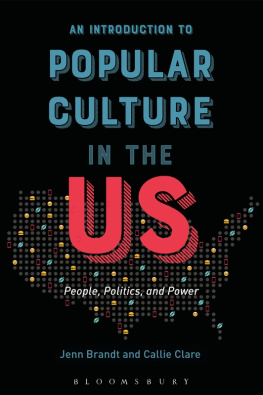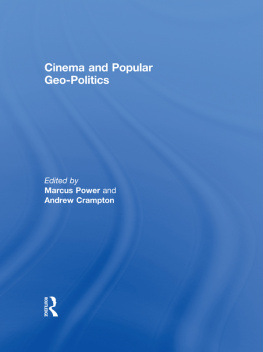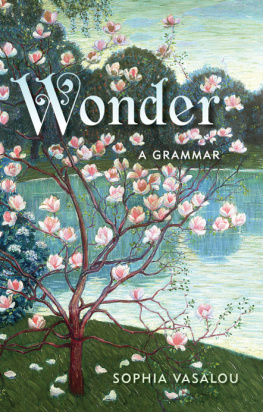Brandt Jenn - An Introduction to Popular Culture in the US: People, Politics, and Power
Here you can read online Brandt Jenn - An Introduction to Popular Culture in the US: People, Politics, and Power full text of the book (entire story) in english for free. Download pdf and epub, get meaning, cover and reviews about this ebook. City: New York, year: 2018, publisher: Bloomsbury Academic, genre: Politics. Description of the work, (preface) as well as reviews are available. Best literature library LitArk.com created for fans of good reading and offers a wide selection of genres:
Romance novel
Science fiction
Adventure
Detective
Science
History
Home and family
Prose
Art
Politics
Computer
Non-fiction
Religion
Business
Children
Humor
Choose a favorite category and find really read worthwhile books. Enjoy immersion in the world of imagination, feel the emotions of the characters or learn something new for yourself, make an fascinating discovery.
- Book:An Introduction to Popular Culture in the US: People, Politics, and Power
- Author:
- Publisher:Bloomsbury Academic
- Genre:
- Year:2018
- City:New York
- Rating:4 / 5
- Favourites:Add to favourites
- Your mark:
- 80
- 1
- 2
- 3
- 4
- 5
An Introduction to Popular Culture in the US: People, Politics, and Power: summary, description and annotation
We offer to read an annotation, description, summary or preface (depends on what the author of the book "An Introduction to Popular Culture in the US: People, Politics, and Power" wrote himself). If you haven't found the necessary information about the book — write in the comments, we will try to find it.
Brandt Jenn: author's other books
Who wrote An Introduction to Popular Culture in the US: People, Politics, and Power? Find out the surname, the name of the author of the book and a list of all author's works by series.
An Introduction to Popular Culture in the US: People, Politics, and Power — read online for free the complete book (whole text) full work
Below is the text of the book, divided by pages. System saving the place of the last page read, allows you to conveniently read the book "An Introduction to Popular Culture in the US: People, Politics, and Power" online for free, without having to search again every time where you left off. Put a bookmark, and you can go to the page where you finished reading at any time.
Font size:
Interval:
Bookmark:
An Introduction to
Popular Culture in the US
An Introduction to Popular Culture in the US: People, Politics, and Power gives students a comprehensive overview of popular culture studies by explaining why and how their daily activities, not only the consumption of media products but food, holidays, schools, etc. are considered popular culture through ample examples. Moreover, the authors attention to diversity issues, i.e., race, gender, class, sexual orientation, and disabilities, with regard to power, ideologies, and social stratification shows students that popular culture is not merely fun and entertainment but a site of struggle for power.
Yasue Kuwahara, Director of Popular Culture Studies and Professor of Communication, Northern Kentucky University, USA
Ray Browne, the godfather of American popular culture studies, would have been proud of how Brandt and Clare help readers appreciate the central role of popular culture in their lives, as well as provide the contextual and critical thinking skills to assess these impulses.
Bob Batchelor, Visiting Professor, Miami University, USA
An Introduction to
Popular Culture in the US
People, Politics, and Power
Jenn Brandt and Callie Clare
Bloomsbury Academic
An imprint of Bloomsbury Publishing Inc

For our students, teachers, and democracy
The writing of this book was a fun, collaborative process that would not have been possible without a number of people and support. Katie Gallof, Susan Krogulski, Gogulanathan Bactavatchalane, and the team at Bloomsbury have been incredibly supportive and enthusiastic about this project from start to finish. Additionally, we would like to thank early reviewers of this text, including Nick Witham and Jordan McClain. To all our friends from Bowling Green, the Department of Popular Culture, and the Popular Culture Association, we thank you for the inspiration and good times, with special shout-outs to our teammates on Nothing But Diamonds, our rivals-turned-friends the ASC Shockers, as well as Mark Bernard, Colin Helb, Mike Lupro, and Marilyn Motz.
Jenn would like to thank Alain-Philippe Durand for his continual mentorship and support; Jody Lisberger for her wisdom and invaluable writing advice; and the faculty and staff at High Point University, particularly the English department, womens and gender studies program, and colleagues Cara Kozma, Kirstin Squint, and Scott Wojciechowski. A special thank you to all my wonderful and supportive friends, including Laurie Carlson and Eva Jones for maintaining the best work-related group text; Nancy Caronia for her unending willingness to play online Scrabble; and Beth Ann Semeraro and Natalie Whaley for keeping me up-to-date with celebrity-related news. Lastly, to my family for instilling an early love for and appreciation of popular culture, and to Stephen for his love, encouragement, and for reminding me that we dont do normal.
Callie would like to thank Lucy Long, Pravina Shukla, Henry Glassie, Vivian Halloran, and the Department of Folklore and Ethnomusicology at Indiana University for all they teach and their guidance; the faculty and staff at Siena Heights University, which fosters a supportive work environment, particularly the wonderful people in the Humanities Division; and Yasue Kuwahara for her professional mentorship and encouragement. Finally, a big thank you to all the people in my personal life: my friends who inspired examples in the book, who sat with me in coffee shops while I worked, offered retreats in their beautiful homes, and are proud of me; and my family who have always supported me, never limited me, and love me, not only because they have to.
In 1973 Ray Browne founded the Department of Popular Culture at Bowling Green State University with the goal of creating a space in academia to explore the amusements, texts, and practices that constituted the leisure activities of average Americans. Believing that elitism was a construct, Brownes emphasis on popular culture as the practice of everyday experience was an attempt to democratize the study of culture in a way that was about the people and for the people. Drawing from the fields of American studies, folklore, and literary studies, the study of popular culture in the United States branched out into a number of different disciplines, including Sociology, Anthropology, and Communication Studies. Similarly, the Centre for Contemporary Cultural Studies (CCCS) at the University of Birmingham, established in 1964, was dedicated to the history of cultural studies, relying heavily on the theories of the Frankfurt School of philosophical, political, economic, and social thought. Until its closing in 2002, the CCCS heavily influenced the field of cultural studies, with an emphasis on subcultures and countercultures, audience reception theory, and media studies.
With each of these foundations for the study of popular culture, the number of schools offering courses, concentrations, and degrees in popular culture has grown. Few of these offerings, however, are housed in full-standing popular culture departments, and are instead found in a variety of programs and departments across campuses globally. The diversity of methods in approaching popular culture is one of its strengths, and this book embraces a number of different theories in exploring the study of popular culture in the United States.
As the study of popular culture has grown and diversified, other disciplines have appropriated the subject matter, most often through the lens of media studies, without acknowledging, understanding, or taking into account the historical underpinnings of the field. While there are a number of texts that provide an introduction to the study of popular culture, the majority of them are UK-based and do not offer an explicit understanding of the study of popular culture as it has developed in the United States. Others focus more on contemporary media, and tend to be a collection of articles rather than an introduction to the theories that support the analysis of media texts. In 1992, Jack Nachbar and Kevin Laus published Popular Culture: An Introductory Text; Nachbar was a professor in the Department of Popular Culture at Bowling Green State University and Laus was affiliated with the university through teaching classes and library research. As a textbook offering an introduction to the study of popular culture coupled with chapters written by contributors illustrating the theory in practice, the book defined the undergraduate study of popular culture at Bowling Green and was adopted at other universities throughout the country. Learning to teach through this approach and using the textbook in classes ourselves, we find great value in this work. However, after twenty-five years, the book is older than most of our students, and so the quest for a new text began.
This book is the result of that quest. It is meant to be a textbook for introductory courses that examine the study of popular culture in the United States today. Beginning with the democratic approach adopted by Ray Browne, the text situates the academic study of popular culture into larger conversations that have evolved over the second half of the twentieth century into the twenty-first century. The theories are presented in such a way as to make them accessible for first-time students, but also to engage with those who already have a familiarity with the field. Though there are examples running throughout each of the chapters, we limited ourselves as the nature of popular culture is always changing.
Our goal is to provide a foundational examination and various lenses to approach the study of popular culture in the United States and to allow room for each individual student and teacher of popular culture to supplement with their own experiences and observations. With this book as the launching-off point, the study of popular culture can be catered to ones personal needs and interests. Various edited volumes with contributions from scholars in the field exist as natural complements to this textbook. Current events, news articles, and contemporary examples from popular culture are also invaluable supplements to this study, and lists of such collections and examples are available on our companion website.
Next pageFont size:
Interval:
Bookmark:
Similar books «An Introduction to Popular Culture in the US: People, Politics, and Power»
Look at similar books to An Introduction to Popular Culture in the US: People, Politics, and Power. We have selected literature similar in name and meaning in the hope of providing readers with more options to find new, interesting, not yet read works.
Discussion, reviews of the book An Introduction to Popular Culture in the US: People, Politics, and Power and just readers' own opinions. Leave your comments, write what you think about the work, its meaning or the main characters. Specify what exactly you liked and what you didn't like, and why you think so.










